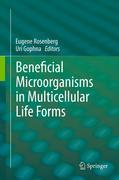
Beneficial microorganisms in multicellular life forms
Rosenberg, Eugene
Gophna, Uri
All animals and plants form associations with hundreds or thousands of different beneficial microorganisms. These symbiotic microbes play an important rolein the development, adaptation, health and evolution of their hosts. This book brings together a group of diverse biologists to discuss microbial interactions with multicellular life forms including insects, corals, plants, and mammals, including humans. The various mechanisms by which microorganisms benefit their hosts are discussed, including providing essential nutrients, preventing disease, inducing the immune system, and combating stress. Since the microbiota can be transferred from parent to offspring, it plays an important role in the origin and evolution of animal and plant species. This book should be of interest to the widest range of biological scientists, merging the studies of host and microbial physiology, symbiosis, and the ecology and evolution of symbiotic partners. Hot topic. Explains the role of microorganisms in the health or disease oftheir hosts. An interdisciplinary view written by experts in the field. INDICE: Microbial symbioses in the digestive tract of lower termites. Insect “symbiology” is coming of age, bridging between bench and field. Chironomids and Vibrio cholera. Role of bacteria in mating selection in Drosophila melanogaster. Legume-microbe symbioses. Plant growth promotion by rhizosphere bacteria through direct effects. Rhizosphere microorganisms. Microbial protection against plant disease. Bacterial Symbionts of Corals and Symbiodinium. Coral-associated heterotrophic protists. Effect of ocean acidification on the coral microbial community. Towards the educated design of bacterial communities.- Oral microbes in health and disease. Role of rumen microbiota in determiningthe feed efficiency of dairy cows. The intestinal microbiota and intestinal disease: irritable bowel diseases. Intestinal microbiota and intestinal disease: inflammatory bowel diseases. A role for bacteria in the development of autoimmunity for type 1 diabetes. Impact of Intestinal Microbial Communities upon Health. Commensalism versus virulence. Prebiotics - Modulators of the human gut microflora. Host genetics and gut microbiota. Microbial symbiont transmission – basic principles and dark sides. Hydra go bacteria. The hologenome concept.
- ISBN: 978-3-642-21679-4
- Editorial: Springer Berlin Heidelberg
- Encuadernacion: Cartoné
- Páginas: 348
- Fecha Publicación: 31/08/2011
- Nº Volúmenes: 1
- Idioma: Inglés
